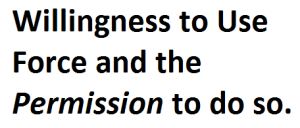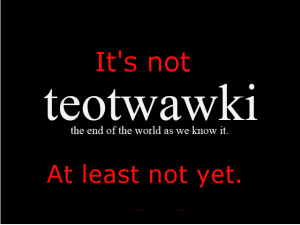
It is my belief that there is a small percentage of people who are freely willing to use force at a moment’s notice. There is a larger percentage who, because it is not something in their normal routine, have to grant themselves permission so to speak and still another group of people who resist the use of violence, even at their own peril.
If I asked you if you were willing to use force to protect yourself or a loved one, I believe the majority of you would say “yes”, but the speed at which we give ourselves permission could vary greatly and can have a drastic impact on the outcome of the altercation.
Willingness
I am not a violent man; I personally see it as something that should be used as a last possible option, but it must be an option. To those people who say that violence doesn’t solve anything, I would say “it absolutely does.” Violence, in the form of war, ended the Holocaust and slavery, to name just two horrible things. Violence or the threat of violence in the form of self-defense has stopped violent crimes of every type. The police use violence and the threat of violence to stop crimes of all kinds.
“All it takes for evil to prevail is for good men to do nothing.”
It is my belief that we have an obligation to confront evil. If we see evil being visited on someone and do not attempt to stop it, we incur some of the guilt that is being inflicted. We could personally intervene or call the police to do so.
I also believe we have a moral obligation to use violence to stop violence being visited upon us. If we do not, I believe we incur guilt for any future evil this person inflicts. We also bare guilt for preventing any future good the victim may have done.
I have heard the argument from Christians in the past that they don’t want to use lethal force because they don’t know the condition of the person’s soul. Their soul is not your personal responsibility in that moment. Being there for your family, providing for them, and living the life God has called you to is your responsibility.
Permission
The word “permission,” used in this context, feels a little clunky to me but is actually a good fit. As I stated earlier, violence is not something most of us use often. Because of this, when we must use it, we often have to grant ourselves permission. Depending on our background, our self-talk could be a very short “do it” or we might have to convince ourselves that while we may not like it, this person/situation is forcing us to do this and that if we do not, we may be severely hurt or even killed.
To me, the use of force of any kind is a two part equation; one part moral and the other part legal. If standing before God or a judge, I could explain why I felt justified in using force; for fear of bodily harm or worse. I then have all the permission I need.
In the heat of the moment, you might not have time to consider an explanation to God or a judge. For this reason, it is important to give yourself permission to use force under certain conditions. The amount of force used should also scale with the threat. Here are a few of my personal thresholds.
I don’t think anyone should participate in the posturing that often takes place in street fights; the pushing and chest bumping, insulting and cursing at each other and so on. To me, this is the same as a warning shot. De-escalation here is the prudent thing to do; walk away but remain alert. If your safety is truly in danger, don’t flex, just act. If your safety is not in danger and you take part in the posturing, using force as things escalate, your actions will not be viewed as “self-defense” in court.
That being said, if someone is yelling and threatening me, I will get ready to use force, both mentally and possibly physically, by getting in a fighting stance, for instance, if, for example, walking away isn’t an option because of being backed physically into a corner. Now, if the person threatening has a weapon and is making threats, the use of force is more than likely called for.
Once someone places their hands on someone else in a violent manner, from a slap, push, punch or choke, the attacker has given the victim permission to use enough force to stop the aggression.
Preemptive Strike
I think preemptive use of force can often prevent a more violent outbreak. For example; you’re out to dinner with your children or grandchildren and someone who has had too much to drink is being verbally abusive to everyone around them. You get up to leave, which draws attention to you, and the man starts cursing you and threatening you as he blocks your exit to the door. Knocking him on his backside could very well stop him from escalating even more and physically attacking you or your loved ones.
Here is another example; a woman is walking by herself in a parking garage. She is approached by a man she doesn’t know. He grabs her by the arm and tells her not to scream. If she either used a combative, aka a punch or kick to cause enough damage to stop the aggression, or pulled a firearm and demanded he leave, she could very well prevent herself being kidnapped, raped and killed.
In neither of these examples did the attacker have a visible weapon, but because of their actions, I believe the victim has a very viable case of using force in self-defense.
Please click here to vote for Prepared Christian as a top Prepper site!
If you liked this article please think about sharing it on the social media listed below, thanks!



